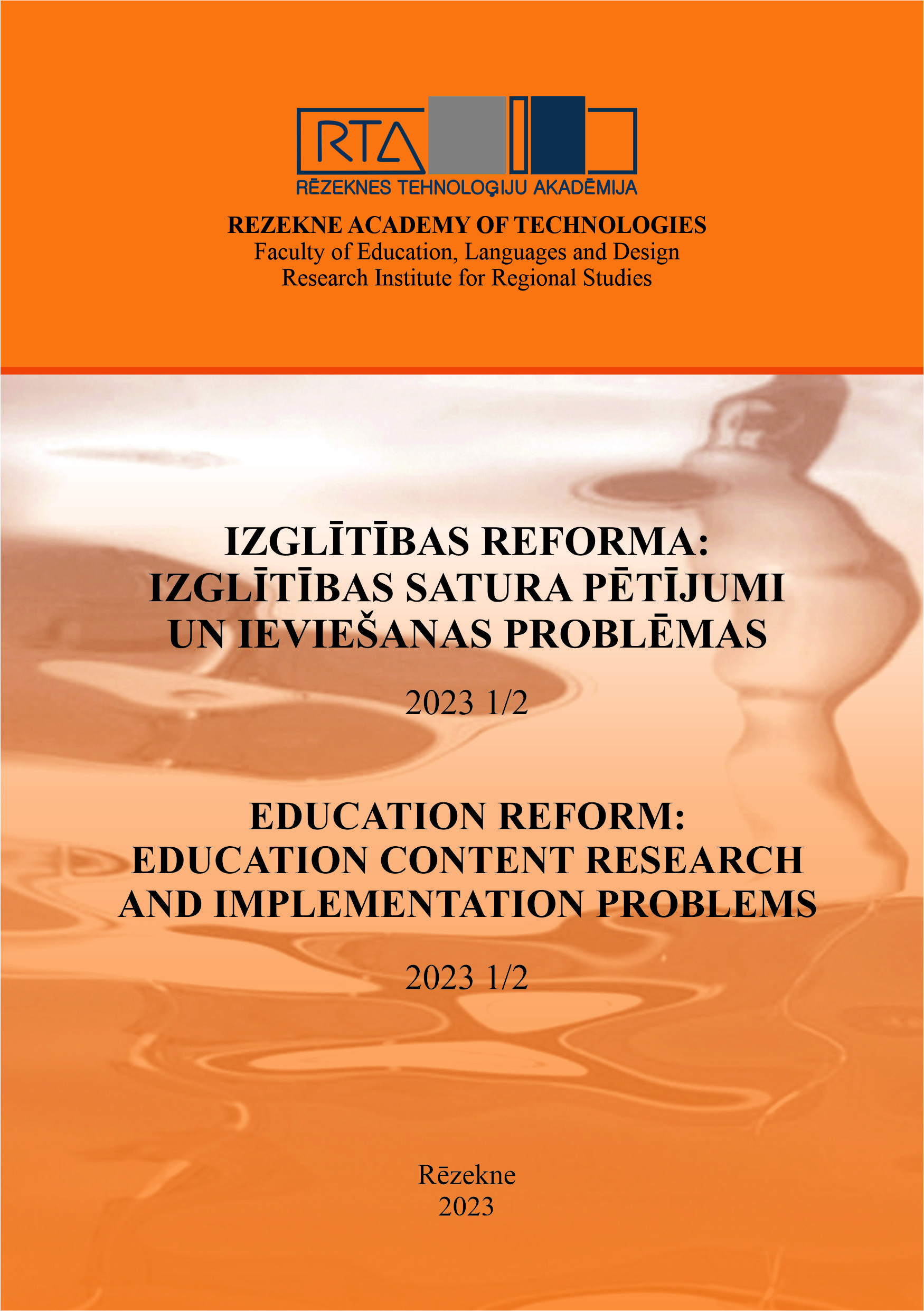DRAMA FOR THE DEVELOPMENT OF COMMUNICATIVE COMPETENCE IN PRESCHOOL
DOI:
https://doi.org/10.17770/er2023.1.7358Keywords:
childdrama, communicative competence, preschoolAbstract
Rapid changes in society force people to face increasingly complex life challenges that require the ability to adapt to changes and function effectively in a social context. The issue of communicative competence, on the level of which the quality of this adaptation and functioning depends to a large extent, is becoming more relevant. The development of communicative competence begins already in preschool. It is necessary to create an appropriate and supportive environment in which the development of verbal and non-verbal aspects of communication, including vocabulary, would be promoted in various ways according to the child's educational needs.
The aim of the paper is to analyze the possibilities of using drama for the development of communicative competence in preschool. The results obtained show the usefulness of drama as a method for the development of communicative competence, as well as differences depending on the gender of a child: boys need more pedagogical support for the development of communicative competence than girls.
References
Akyil, Y., Deniz, M.E. (2022). The effect of creative drama-based psychoeducation program on emotional intelligence of adolescents. OPUS– Journal of Society Research, 19(46), 206-216. Pieejams https://dergipark.org.tr/en/download/article-file/2326573
Altun, M. (2019). Drama: a neglected source in language teaching to improve communication. International Journal of English Linguistics, 9(5), 242-248. Pieejams: https://ccsenet.org/journal/index.php/ijel/article/view/0/40501
Andrejeva, R. (2023). Jaunrades un uzņēmējspējas pilnveide pirmsskolā. Rēzekne: Rēzeknes Tehnoloģiju Akadēmija.
Beller, S. (2008). Fostering Language Acquisition in Daycare Settings: What Does the Research Tell Us? Working Papers in Early Childhood Development, No. 49. Bernard van Leer Foundation. PO Box 82334, 2508 EH, The Hague, The Netherlands. Pieejams: https://eric.ed.gov/?id=ED522692
Brice, B, Bula-Biteniece, I., Gaide, D., Irbe, I., Lauka, A., Ozola, D., Rolanda, L., Silova, M., Tempelfelde, I. (2019). Pirmsskolas mācību programma. Pieejams: https://mape.skola2030.lv/resources/10
Buboviča, J. (2014). Didaktiskā spēle 5-6gadus vecu bērnu kognitīvajā attīstībā. Sabiedrība. Integrācija. Izglītība. 1.daļa. DOI: https://doi.org/10.17770/sie2014vol1.784
Coskun, L. (2014). The girls are better at language learning: A comparative approach. Journal of Educational and Social Research, 4(2), 17. DOI: 10.5901/jesr.2014.v4n2p17
Demirekin, M., & Yalçin, H. (2021). Games & Drama applications in language acquisition. OPUS International Journal of Society Researches, 17(37), 4027-4048. DOI: https://doi.org/10.26466/opus.881111
Dzintere, D., Stangaine, I., Augstkalne, D. (2014). Bērna komunikatīvās kompetences attīstība. Rīga: RaKa.
Gong, H. (2022). Application of multimedia human-computer interaction technology in preschool children Drama Education. Advances in Multimedia, 2022. DOI: https://doi.org/10.1155/2022/6388057
Guzal, N. (2022). Pedagogical-psychological aspects of the formation of social consciousness in preschool children. Yosh Tadqiqotchi Jurnali, 1(5), 40-46. DOI: https://doi.org/10.5281/zenodo.6628393
Güngör, E. B., & Ates, A. (2019). Okul Öncesi Çocuk Gelisiminde Yaratici Dramanin Katkilari. Journal of World of Turks, 11(1). Pieejams: https://web.s.ebscohost.com/ehost/pdfviewer/pdfviewer?vid=0&sid=63a f2779-c99e-47c1-8eba-6d336a84e384%40redis
Holm, A., Van Reyk, O., Crosbie, S., De Bono, S., Morgan, A., & Dodd, B. (2023). Preschool children’s consistency of word production. Clinical Linguistics & Phonetics, 37(3), 223-241. Pieejams: https://doi.org/10.1080/02699206.2022.2041099
Hornáčková, V. (2017). Drama play a creative method in preschool education. European Proceedings of Social and Behavioural Sciences, 31.DOI: https://doi.org/10.15405/epsbs.2017.10.53
Hrechyshkina, I. A. (2019). The problem of coherent speech of children of junior preschool age in modern scientific discourse. Pedagogy and Psychology, 17. Pieejams: https://doi.org/10.31174/SEND-PP2019-198VII80-04
Kramiņš, E., (2016). Retorikas rokasgrāmata. Runāsim skaidri, spilgti, iedarbīgi! Rīga: SIA “Biznesa augstskola Turība”.
Kryeziu, S. D. (2019). Language development through drama in preschoolers. European Journal of Language and Literature, 5(1), 15-22. DOI: https://doi.org/10.26417/ejls-2019.v5i1-189
Mages, W. K. (2017). Drama-based interventions and narrative. In The Routledge International Handbook of early Literacy Education (pp. 296-307). Routledge.
Malinauskienė, D., Gumuliauskienė, A. (2018). Opportunities of modern education of preschool-age children. Society. Integration. Education, Volume II, 602-612. DOI: https://doi.org/10.17770/sie2018vol1.3168
Maron-Puntarelli, C. A. (2023). Am I Your Friend, Grandchild, Peer or Something Else? Preschoolers’ Views of Their Relationships with Elders in an Intergenerational Program. Pieejams: https://www.proquest.com/openview/1be0197f51867708753c5d4ce3e9af90/1?pqorigsite=gscholar&cbl=18750&diss=y
Mashkhura, R. (2021). Culture of Speech Development in Preschool. European Journal of Life Safety and Stability (2660-9630), 12, 377-381. Pieejams: http://www.ejlss.indexedresearch.org/index.php/ejlss/article/view/331
McDuffie, A. (2021). Verbal Communication. Encyclopedia of Autism Spectrum Disorders, 5029-5029. Pieejams: https://link.springer.com/referenceworkentry/10.1007/978-3-319-91280-6_1709
Mukhtoraliyevna, Z. S., & Odilovna, B. R. (2023). Age and psychological and pedagogical bases of speech development of preschool children. Open Access Repository, 4(2), 763-767. Pieejams: https://wos.academiascience.org/index.php/wos/article/view/3382
Pičukāne, Ē. (2020). Drāmas elementu izmantošana latviešu valodas nodarbībās iesācējiem. Pieejams: https://epale.ec.europa.eu/lv/blog/dramas-elementuizmantosana-latviesu-valodas-nodarbibas-iesacejiem
Sebre, S. & Miltuze, A. (2022). Attīstības psiholoģija. Cilvēka attīstība visas dzīves garumā. Rīga: Zveigsne ABC.
Tūbele, S., & Anoško, L. (2019, May). Žesti kā komunikācijas īpatnība bērniem ar valodas sistēmas nepietiekamu attīstību. Society. Integration. Education. Proceedings of the International Scientific Conference. Vol. 3, 136-145. DOI: https://doi.org/10.17770/sie2019vol3.3862
Ulubey, Ö. (2018). The Effect of Creative Drama as a Method on Skills: A MetaAnalysis Study. Journal of Education and Training Studies, 6(4), 63-78. Pieejams https://eric.ed.gov/?id=EJ1172791
Umuzdaş, S., Doğan, A., & Umuzdaş, M. S. (2019). Impact of musical creative drama education on self-confidence of preschool children. Journal of Education and Training Studies, 7(11), 10-22. DOI: https://doi.org/10.11114/jets.v7i11.4471
Voltmer, K., Hormann, O., Pietsch, M., Maehler, C., & Von Salisch, M. (2021). Teaching the teachers about language support strategies: effects on young children's language development. Frontiers in psychology, 1462. DOI: https://doi.org/10.3389/fpsyg.2021.660750






